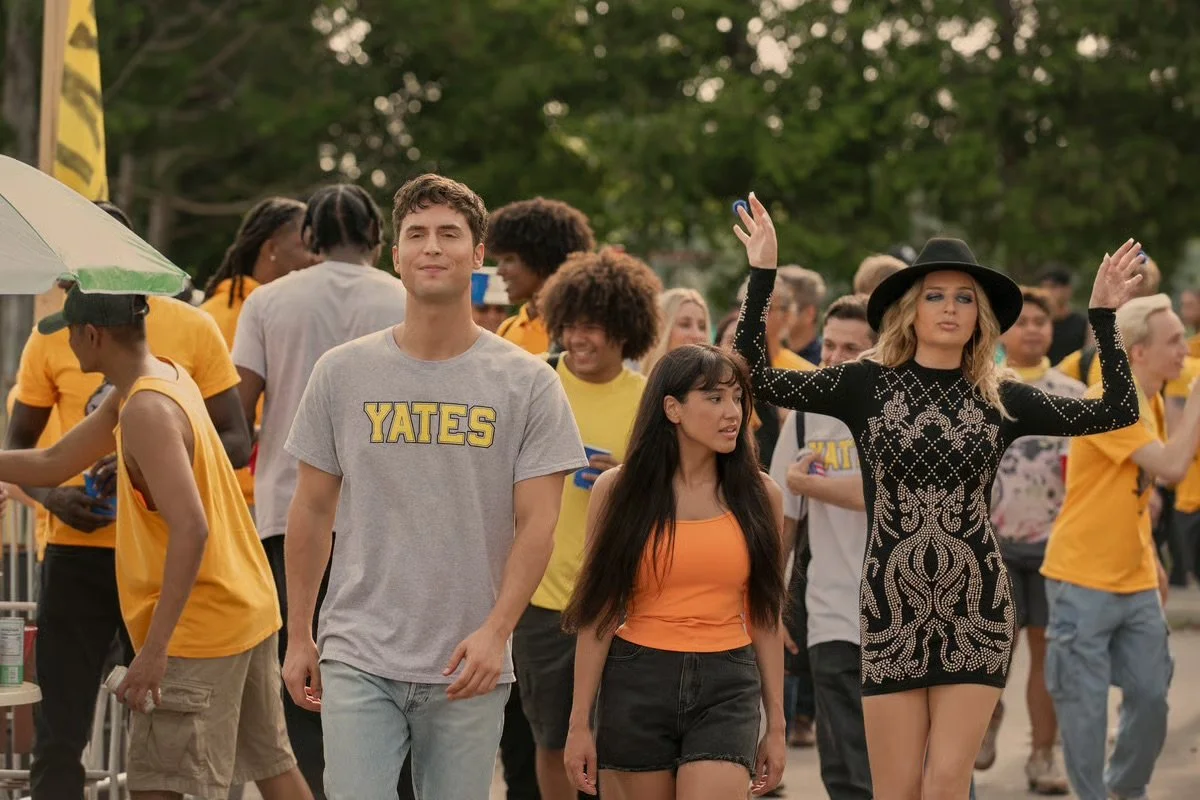Review: Becoming Benny – Overcompensating's Coming-Out Tale Finds Power in Subtlety
Image Via Prime Video
Benito Skinner brings his signature flair to Amazon’s Overcompensating, but this collegiate coming-out tale leans more into heart than hilarity. It’s part memoir, part satire, and wholly conflicted.
In the saturated world of streaming comedies, Overcompensating emerges with a distinct voice and a deeply personal lens. As a semi-autobiographical debut by Benito Skinner—best known as @bennydrama7—this Amazon Prime Video series, produced by A24, carries the bittersweet weight of growing up queer in an aggressively heteronormative world. Skinner, a viral favorite for his hilariously camp Instagram personas and his unfiltered comedic takes on pop culture, takes an unexpected turn here. Instead of doubling down on the loud, the fabulous, and the outlandish, Overcompensatingexplores the quieter, messier terrain of repression, performance, and self-actualization.
The eight-episode season opens with Benny, Skinner’s on-screen counterpart, arriving at the fictional Yates University. A high school football star and valedictorian from a conservative Idaho town, Benny begins college life determined to keep his queerness buried. It’s a pointed contrast, given Skinner’s real-life flamboyance and hyper-awareness of gay cultural touchstones. By playing it straight—literally—Benny becomes the vehicle through which Skinner examines a time when fear, not pride, was the organizing principle of his identity. It’s a bold inversion of the loud-and-proud aesthetic that made Skinner famous, and it makes for a layered, often surprisingly melancholic viewing experience.
Image Via Prime Video
The show’s tone flits between satire and sincerity. Directors Desiree Akhavan (The Bisexual) and Daniel Gray Longino (Pen15, The Chair) bring a subdued polish to the look of the show, grounding its campus setting in hues of nostalgia and uncertainty. The narrative orbits Benny’s evolving friendship with Carmen (Wally Baram), a fiercely intelligent freshman grappling with her own trauma and identity. Their bond isn’t about romance but mutual excavation—each slowly unearthing who they really are beneath the roles they’ve been conditioned to play.
There are glimpses of the surreal and absurd—an imagined Nicki Minaj lip-sync performance, frat boys barking homophobic slurs as a form of affection—but they’re fleeting. The tone often steers back toward grounded realism, which helps the show avoid caricature but occasionally dampens its dramatic stakes. While some characters veer into trope territory—like the flamboyant George (Owen Thiele) or Carmen’s hypersexual roommate Hailee (Holmes)—they remain watchable thanks to committed performances. Mary Beth Barone, Skinner’s real-life collaborator, adds complexity to Benny’s sister Grace, whose own identity crisis mirrors Benny’s in unexpected ways.
Image Via Prime Video
What’s most striking is how Overcompensating leans into ambiguity. It doesn’t offer easy resolutions or triumphant revelations. Instead, it lingers in the in-between spaces: the unspoken tension between desire and fear, the dissonance of performing someone else’s idea of masculinity, the ache of recognizing your true self too late to act on it. When Benny finally starts to open up—tentatively exploring feelings for a charming classmate (Rish Shah), reconsidering his business major, confronting his past—the breakthroughs feel earned, if underplayed.
Still, the series stumbles in its structure and consistency. The tone fluctuates from scene to scene, sometimes awkwardly transitioning between heartfelt confession and stylized sketch comedy. Skinner’s age occasionally undercuts the illusion of college-aged authenticity, and some supporting characters lack the dimensionality to transcend their narrative functions. But even when it falters, the show remains intriguing, largely because Skinner imbues it with such earnestness.
There’s also something deeply refreshing about a queer show that isn’t trying to sell triumph or trauma as its main course. Overcompensating is more about the awkward, vulnerable, often contradictory space that exists in between. It’s about coming out as a process, not a punchline or plot twist. By embracing that liminality, Skinner carves out new emotional ground in a genre too often defined by extremes.
Overcompensating may not be the fully realized queer masterpiece some hoped for, but it’s a compelling and commendable attempt to tell a different kind of coming-of-age story—one rooted not in arrival, but in evolution. It’s an invitation to reflect on the masks we wear, the truths we hide, and the courage it takes to start becoming ourselves.











